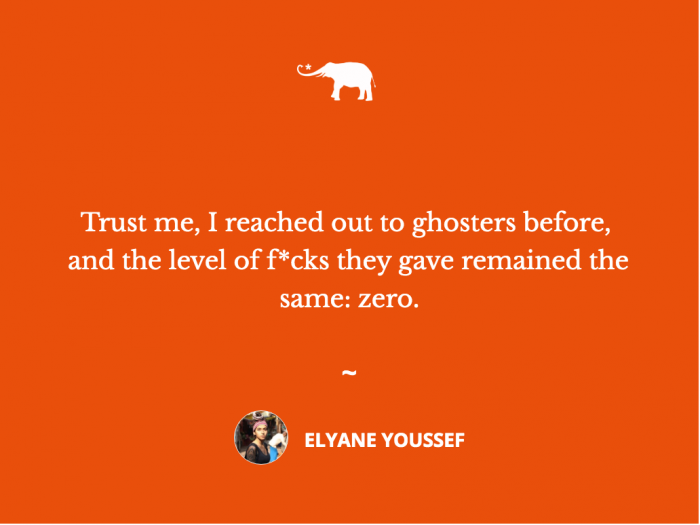View this post on Instagram
I think by now no one needs an explanation for what ghosting is.
We’ve all been there in one way or another: we either ghosted someone or someone ghosted us.
In case you need a refresher, ghosting is when someone ends the relationship (or whatever is going on) suddenly and surprisingly without offering any explanation. In other words, the one who disappears on us withdraws from all forms of communication. Eek. It stings.
I ghosted a few people when I was younger and foolish and had no idea how to deal with emotions or communication or relationships. But I’ve also been ghosted—a lot.
Although ghosting is common these days, it is not okay. Ask me about it. If there’s anything in this life that I know better than cooking, it’s how to deal with ghosting. I haven’t been ghosted for awhile now (thank goodness), but there’s no harm in passing on the torch of wisdom, right?
Before offering my no-bullsh*t ways of how to deal with a ghoster, be assured that I know the feeling all too well. The first couple of days, we have no idea we’ve been ghosted. We keep checking our phones, and when we don’t find any calls or messages, we throw the casual “they’re just busy” line.
Thinking they’re busy comforts us. It gives us a viable reason. Fast forward three days, and we start revisiting our conversations. We see them online. We wonder whether we should drop a “hello.” There’s no harm in saying “hello,” right?
Then our mind starts playing tricks on us, “What are you doing? What’s the ‘hello’ for? You know very well that if they’re interested, they would have called by now.”
We chill. We wait. Then our mind kicks in again, “What if they had an accident? What if they’re testing the waters and waiting for me to speak to them? What if they think less of me for not talking to them?”
From experience (and lots of tears), this is the worst and most painful phase after we’ve been ghosted. Our rattling minds come up with thousands of scenarios every single hour. And most of these scenarios are barren and they keep us hooked for weeks and sometimes months. (Once, I thought my ghoster was busy for seven months. True story.)
What to do? How to behave? How to cope?
Here are two ways to recover if we’ve ever been ghosted:
1. Don’t reach out. Read this again. Don’t. Reach. Out. If there’s anything I have learned during my 32 years on Earth, it is that people are never too busy to call or message. Nothing can stop someone from making a call—unless they don’t want to call. The truth is right in front of us, but we choose to tint it with reasons that make us feel better. Here’s the truth we choose not to believe: that person just doesn’t want to get in touch (for millions of possible reasons).
My partner and I have been together for more than three years now, and he indirectly taught me an important lesson: consistency. When we first started dating, he surprised me with how consistent he was. He didn’t even leave me the space to talk to him. He was always the one to reach out. I’m not saying this is how things should be (that was my own experience), but my point is, he didn’t let me question (not even for a second) if he wanted me or not.
Having said that, those who want us, will claim us. Those who don’t, will leave. Ghosting is an ugly form of leaving, and we should treat it as such. So as difficult as it may sound, we are not a priority to that person and talking to them won’t change this truth. Trust me, I reached out to ghosters before, and the level of f*cks they gave remained the same: zero.
2. Don’t wait for a closure. It’s natural when we are ghosted to seek answers. The ugly truth is that we don’t always get the answers we need. Hundreds of questions might keep revolving in our heads with no place to go. We fantasize about the day when they reach out and admit it was foolish and wrong what they did and offer us the explanation we’ve been helplessly seeking.
Reality check: this is a movie, maybe a novel, but not always reality. Don’t get me wrong. They might reach out. And ironically, they might reach out years later when you’ve moved on and can barely remember what happened. But more often than not, they might not get in touch, and we need to make peace with this fact.
After weeks, maybe months, maybe years, you won’t be interested in the answers anymore. Trust me. Time will diminish the intensity of your questions bit by bit.
Time won’t heal the pain, but it will reduce it. The questions you’ve always had in your mind will become mere scattered words that might never find the exit.
Okay. So we shouldn’t reach out, and we shouldn’t wait for closure. What to do?
Give it time. Now, it’s hard. In this very moment, it stings. Years from now, it won’t matter anymore.
Give it time because there’s nothing else we can do.
~











Read 8 comments and reply